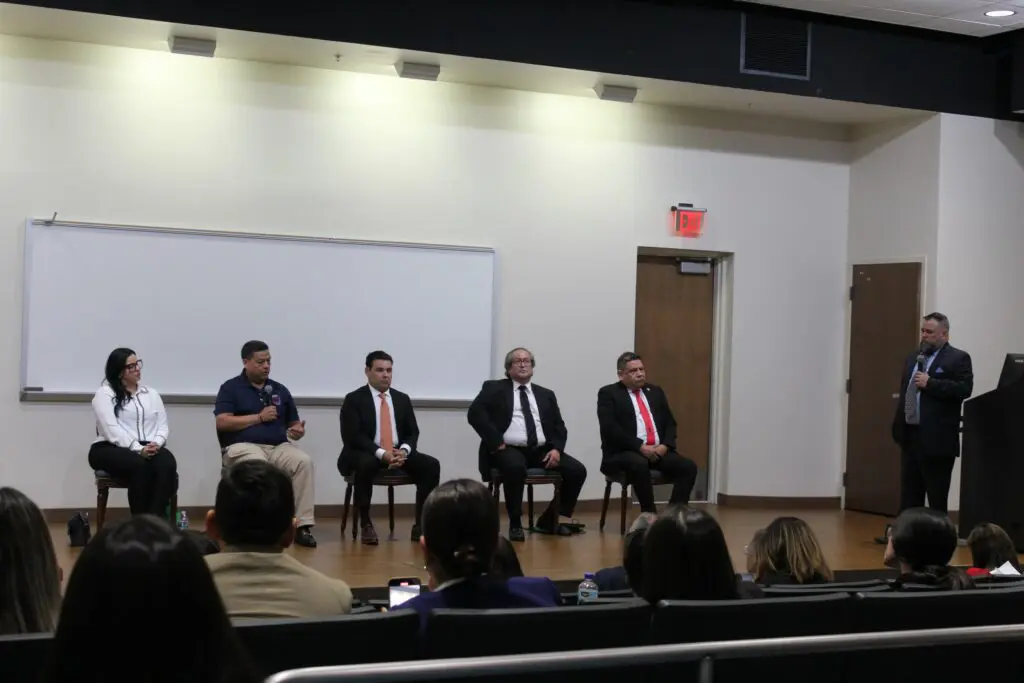FNU Community Forum: A Beacon of Legal Guidance for Immigrant Students
Hialeah, FL – March 2025 – Under the lights of the Florida National University (FNU) auditorium, an expectant silence preceded the start of what would be a significant night for dozens of families, students, and immigrant professionals. On Wednesday, March 12, the educational institution, recognized for its SACS accreditation —the highest in the southeastern U.S.—inaugurated the first FNU Talks: Community Forum, a series of free talks designed to bring critical information to the community. The inaugural topic could not be more urgent: “Migration Challenges 2025”.
“Our mission is clear: to be a bridge between specialized knowledge and those who need it most,” explained the event host and FNU educational liaison, Mr. Jairo Cruz. “At a time when immigration policies are debated in courts and headlines, we want our community to have concrete tools, not empty promises.”
The forum, broadcast in a hybrid format, brought together a multidisciplinary panel: immigration lawyers, criminal lawyers, representatives of foundations accredited by the Department of Justice, and even someone who benefited from the emblematic NACARA Law of 1997. The attendees — mostly Venezuelans, Colombians, Nicaraguans, and Cubans — took frantic notes. It was no wonder: the rules of the game have changed.
FNU Talks: Education as Public Service
Florida National University is no stranger to migration crises. Founded in 1982 by the Regueiro family, the institution has trained generations of Hispanic professionals, many of whom arrived with suitcases full of dreams and paperwork in process. The FNU Talks format is simple yet powerful: free talks open to the public, with no political affiliations. “We don’t sell magic solutions here,” warned the host during his introduction. “We bring accredited experts and facilitate a safe space for uncomfortable questions.”
The choice of the migration topic was not accidental. With the end of Temporary Protected Status (TPS) for Venezuela, Nicaragua, Haiti, and Cuba in 2025, and the increase in deportations for minor offenses, the South Florida community faces a legal maze without clear maps. “When fear spreads, misinformation becomes common currency,” said Giovanni Pereira of TFKM Foundation, one of the participating organizations. “Our job is to replace myths with roadmaps.”
Student Visa: A Path to Legal Stability
One of the most revealing moments came with the explanation about F-1 visas. Michelle Machen, FNU admissions representative, detailed the process to an audience that exhausted the contact cards:
“If you have legal status — even if temporary — you can apply for a change to a student visa without leaving the country. Requirements: valid passport, I-94, translated high school diploma, and a financial sponsor, who can be a family member.”
FNU offers a range of programs, from English classes to undergraduate and graduate studies. The university provides personalized advice and accessible options, including:
“The I-20 is not just a document; it’s an opportunity to study and regularize your status,” explained Machen.
But even this option has cracks. Nicolás Aguado, immigration lawyer and himself a Nicaraguan immigrant, warned:
“The government is rejecting more applications. If your tourist visa expired yesterday, you must act today. Tomorrow could be too late.”
Criminality and Migration: Hidden Risks
José Companioni, a criminal lawyer with 22 years in courts, took the microphone for an uncomfortable warning: “A ‘simple’ arrest for driving without a license can bury your dreams of residency.” In a disturbing twist, he explained how states like Florida have criminalized everyday actions for undocumented immigrants:
“If you don’t pay a traffic fine, the state suspends your license. If you are stopped driving —even if it’s to take your child to the hospital—it’s a minor offense. And immigration authorities could use these arrests, without conviction, as an excuse for express deportations.”
TPS and Asylum 2025: What Alternatives Remain?

The cancellation of TPS for four countries was the hottest topic. Carlos Pereira, founder of AMIGOS Foundation and veteran of the NACARA battle, painted a bleak picture: “In the 90s, TPS was a lifeline. Today, it’s a patch that they rip off without notice.”
Nicolás Aguado added, “Venezuelans who arrived in 2023 can no longer rely on anything. Their only option is asylum, but they must apply within 12 months. The reality? Most don’t do it out of ignorance or fear.”
Among the audience, Luisana, a Venezuelan nurse, shared her anguish: “My TPS expires in June. Now what? Go back to my country?” The answer came in a whisper: “Protection against deportation,” suggested Aguado. “It’s a temporary permit, but it gives you time to fight.”
“Time is crucial. Those who didn’t act before face more difficult paths,” Aguado emphasized.
Citizenship: The Star that Illuminates Families
In a moment of hope, Carlos Pereira of the AMIGOS Foundation shared how his journey from sponsored immigrant to U.S. citizen enabled him to help others:
“My brother sponsored me in the 90s. Today, as a citizen, I help others.”
Using a metaphor, he said:
“Imagine a Christmas tree. Citizenship is the star: from there, you protect your spouse, minor children, parents, and siblings. Yes, siblings.”
Pereira emphasized:
“It’s not easy, but it’s possible. We have approved seniors of 80 years who only write their name.”
The AMIGOS Foundation also offers free citizenship classes, including support for seniors and individuals with limited English proficiency.
What You Can Do Now
The 2025 Community Forum reinforced a vital message: information saves lives. Faced with changing immigration policies, it is essential to take action:
- Apply early for student visas or asylum
- Avoid unofficial legal advice from unaccredited sources
- Explore U.S. citizenship if eligible
- Contact FNU’s Admissions Team for personalized guidance
Disclosure
The opinions expressed by the panelists are independent and do not necessarily reflect the position of Florida National University. For personalized legal advice, consult directly with accredited professionals.
Interested in using education to pursue legal status in the U.S.? Explore FNU’s programs and find the path that’s right for you.